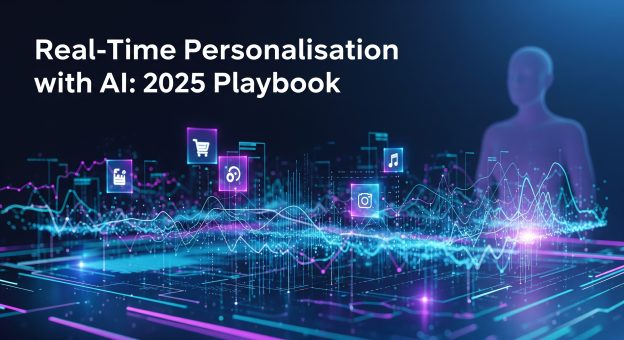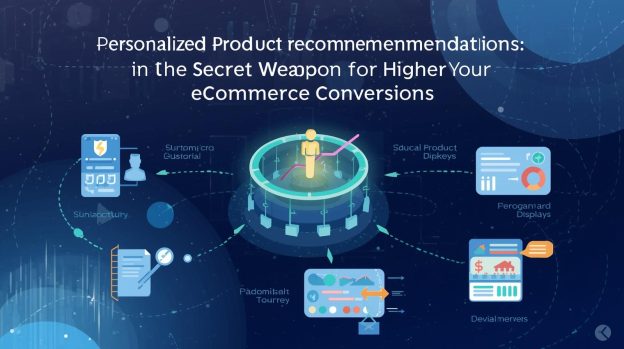Real-Time Personalisation with AI: 2025 Playbook

In the age of AI, transformations keep rolling in and surprise customers with what they witness in mobile apps and websites. Now, the world of real-time personalisation is here. In this, mobile app development companies don’t use past customer data, purchase history and behaviours for personalisation.
Instead, developers use real-time data insights to create custom personalised messages and offers. You can offer a dynamic experience to your customers by enabling personalisation on real-time data and insights. In this blog, we will understand how real-time personalisation is creating a lasting impact on customers’ experience.
What is Real-Time Personalisation and why does it matter to businesses?
AI can effectively understand customer preferences, behaviour and data on mobile applications and websites in real-time. Based on this, it delivers tailored offers, content, messaging and experiences to customers. The traditional personalisation did not have dynamic behaviour because it used a wide database, including customers’ information, through which it created tailored experiences and offers.
But now, businesses can adopt real-time personalisation in mobile applications to engage with customers more efficiently. It enhances their overall customer experience, drives conversions and fosters loyalty.
How does Real-time Personalisation Work?
Unlike traditional personalisation, real-time personalisation deals with dynamic data (i.e., real-time data). Let’s see how the best mobile app companies implement real-time personalisation in retail applications –
- Integration of artificial intelligence personalisation into mobile applications can help businesses track high-intent signals.
- By doing this, businesses can learn about customers’ search inputs, live browsing behaviours, campaign interaction, and cart changes.
- For example, suppose a customer added an item to the cart, but abandoned it without placing the order.
- Personalisation in mobile apps works by sending a notification or a nudge to customers to complete their order from the mobile app.
- By creating a unified profile and routing the customer data into it, AI personalisation helps by sending real-time updates in milliseconds.
- Based on the customers’ actions, like changes in cart, search inputs or interaction with the marketing campaign, businesses can trigger experiences like mobile push notification, email marketing, in-app banner, etc.
- Businesses can track the customer responses and experiences on the mobile applications, based on which they can tailor the AI personalisation strategy.
- You can adjust the real-time AI personalisation depending on the new signals coming from customers.
Let’s Look at Practical Use Cases of Real-time Personalisation in Retail
- Real-time AI personalisation is widely used in marketing, retail, social media, etc. The benefits of real-time personalisation as opposed to traditional personalisation are far advanced. Companies leverage AI personalisation for mobile applications to take advantage of increased revenue, engagement and sales.
- AI personalisation in retail can offer relevant and targeted content for customers, which will result in higher customer retention and sales. You can improve customer engagement by embedding real-time AI personalisation in ecommerce mobile applications and websites to encourage interaction and interest from customers.
- Real-time personalisation deals with data collection and unification. You can unify the personalised data coming from mobile applications, email campaigns, website interactions, etc., into a single customer view.
- The real-time data processing is extremely fast. Mobile applications employ advanced AI algorithms that evaluate incoming data in just a fraction of a second. Based on this, they serve relevant offers and content to customers.
But first, you should understand what your end goal is before you integrate real-time AI personalisation into the mobile applications. Do you want better customer retention, higher sales or higher engagement from customers?
Audience segmentation is most important when companies group the customers based on their shared behaviours and interests so that they can offer more targeted content and offers.
To Sum Up
The most use of real-time personalisation is witnessed in e-commerce websites so far. By embedding AI technology in e-commerce mobile applications, businesses can understand customer needs and offer targeted and accurate recommendations based on their interest, behaviours and purchase history. Using machine learning algorithms on real-time data delivers personally curated product recommendations that drive sales and more conversions.
Dynamic content keeps adapting based on user preferences, interests and behaviour on the internet. You can personalise the offers and content based on customers’ interests. Through this, you will be able to increase customer engagement as they spend more time on the website and mobile application. To leverage AI personalisation for your business, you can contact one of the best app development companies in USA– VerveLogic. For your custom AI solutions, you can contact our developers at VerveLogic, who are experienced and well-versed and have completed more than 200 projects.



